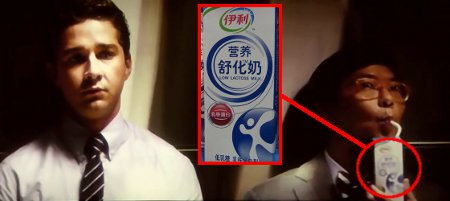Chinese products are increasingly finding their way into interesting places like The Big Bang Theory with Shuhua Milk, made by the Chinese dairy giant Yili and Chinese computer company Lenovo and the electronics company TCL as marketing partners on Iron Man 3. Though The Big Bang Theory doesn’t air on regular Chinese television, it has drawn as many as 18 million hits on domestic video sites.
“Chinese consumers are wowed when they see Chinese brands in American media,” said Janie Ma, entertainment marketing director at Ogilvy Beijing, which represents Lenovo. “It polishes the brands’ local image.”
This practice is widely acceptable in China, where brands sometimes subsidize as much as 30 percent of a movie’s budget for the privilege. Chinese director Feng Xiaogang’s film A World Without Thieves, for example, featured BMW, Nokia and Canon, among others.
Now that Chinese films have become completely saturated with such ads, Chinese companies turn to films from the West. This is coupled with a general belief that Hollywood represents a globalized cool.
“We think Hollywood movies have great advantages in their quality, box office [reach] and commercial operation compared with domestic films,” said Xie Wei, brand manager for Meters/Bonwe. “To a certain extent, Hollywood means high-tech, high box office, high quality.”
With Hollywood films dominating the Chinese box office, the tact may be working. In the 2011 film Transformers: Dark of the Moon, a Chinese scientist slurps a carton of Shuhua Milk in an elevator with star Shia LaBeouf, saying “Let me finish my Shuhua Milk” in the Chinese version. The line became an online catchphrase in China; sales of Shuhua Milk rose 12 percent last year.
“One of the key goals of product placement is to make a brand seem bigger than it actually is,” said Morgan Spurlock, director of the documentary The Greatest Movie Ever Sold and a product-placement expert. “And in a lot of places around the world, nothing does that better than being in a Michael Bay movie.”
This hasn’t stopped some Chinese consumers from criticizing the moves. “It is creepy to watch Transformers 3,” wrote one user on blog Sina Weibo. “The hero, who works in a big U.S. company focusing on national defense, would use a computer produced by Lenovo And people drink Shuhua Milk produced by China ”
“A beautiful day begins with a bottle of Shuhua Milk ” said Tong Xi, a marketing manager at the magazine Cosmo Bride. “So embarrassing, it not only smashed the brand’s image but destroyed Transformers: Dark of the Moon.”
There are risks for Chinese brands targeting a native audience, as some Hollywood films are barred in China and there are limited slots for non-Chinese movies. Also, some Chinese companies are unfamiliar with the way that Hollywood production works.
“The industry [in China] is really fluid and flexible. There are no established mechanisms, no established procedures,” said Norm Marshall, a Burbank product-placement expert. “I had one brand that was going to spend some ungodly amount of money on a movie that was already three-quarters in production. Somebody [in China] was telling them: ‘We can do it.’ And there was no way it could be done.”
Source: L.A. Times


